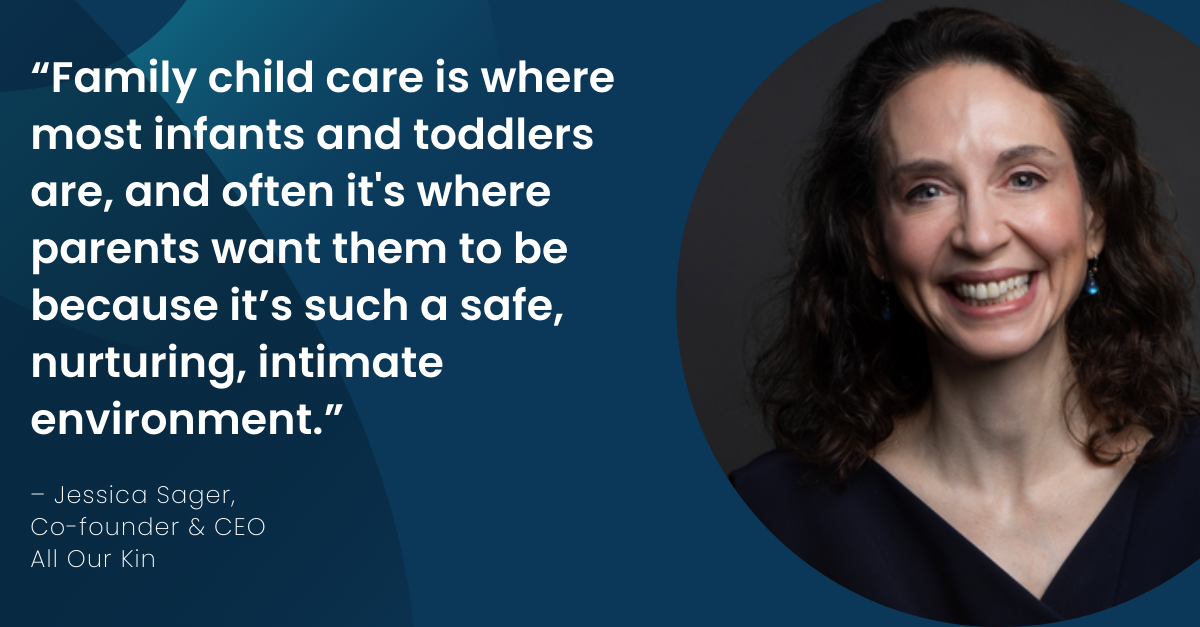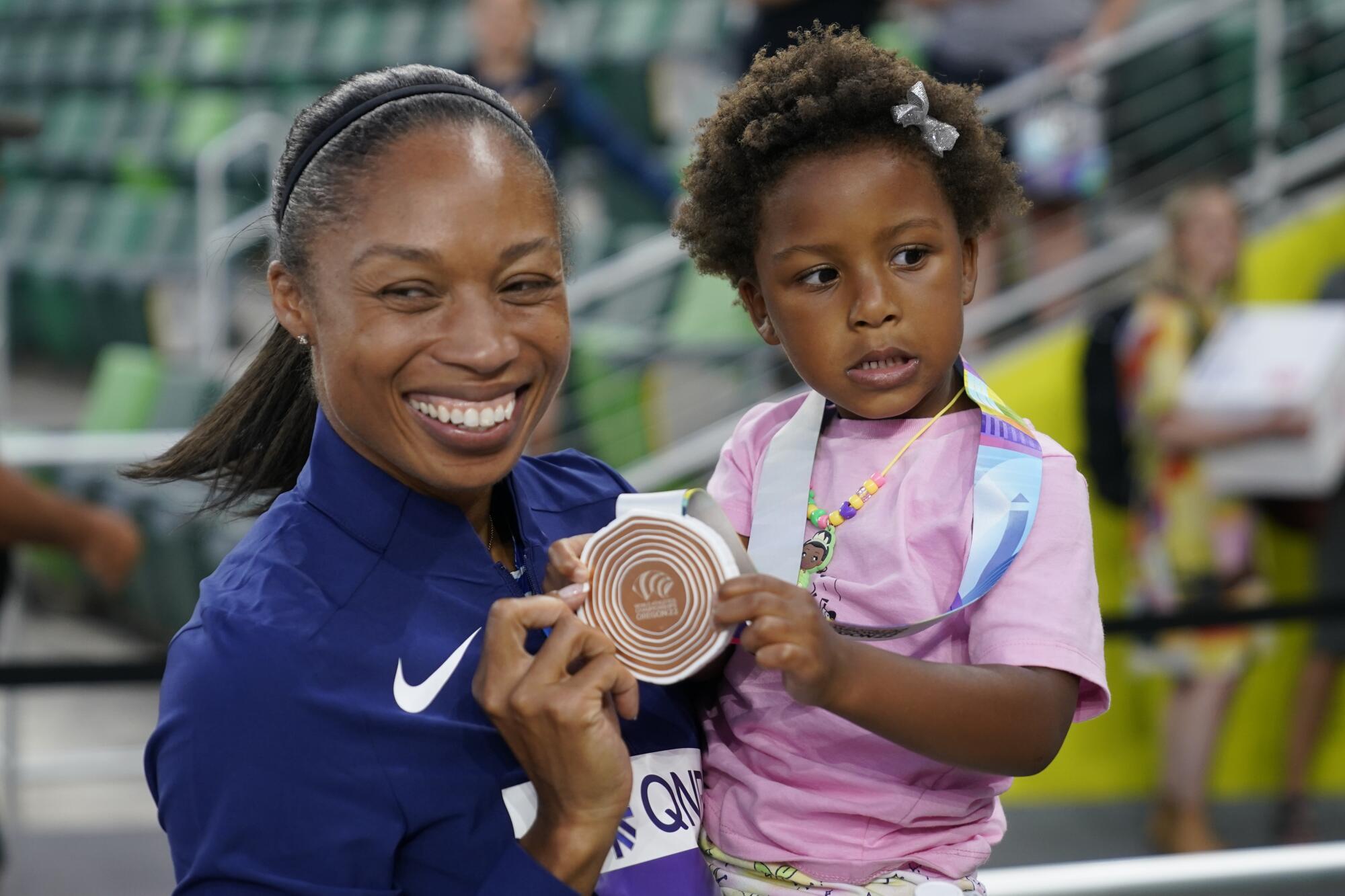
And we’re largely left to figure it out on our own because there’s no state or national policy infrastructure to advocate for affordable, quality child care. While some business leaders see the importance of supporting working families through child care subsidies and on-site facilities, most companies offer no child care benefits.
Things could be changing though. A growing grassroots effort is pushing for more support for working families. National nonprofit MomsFirst is advocating for more businesses to invest in child care — citing a return on investment of up to 425% — and its CEO Reshma Saujani succeeded in adding the topic to the list of questions in the first 2024 presidential debate. All Our Kin, another nonprofit, is galvanizing a network of small, family child care providers into a national force. These and other efforts are making headway: Voters want leaders from across sectors to help make caregiving easier to find and afford.
This issue of Starting Early looks at family child care, including an interview with All Our Kin’s founder Jessica Sager, to better understand the need for and challenges faced by this critically important piece of the child care puzzle in America.
Atiya Weiss
Executive Director, the Burke Foundation
1. With family child care, big things come in small packages

Many working parents who require child care rely on small, local, family child care educators who open their homes and their hearts to families — each usually caring for up to 5 children.
Of nearly 11 million young children with working mothers, 40% spend more time in family child care — largely women-owned businesses with no other staff — than in such other child care settings as large centers or in-home care by a nanny.
Family child care is often the best option for several reasons:
✅ Facilities tend to be near where parents work.
✅ They’re more affordable.
✅ They offer flexible, parent-friendly schedules.
✅ They’re run by caring people who provide a personal, often culturally aligned, connection.
Educators like New Jersey’s Beverly Lee, who has run a family child care business for decades, are deeply devoted to their charges. “I want the children to experience precious little moments when they walk through our doors,” says Lee, who is also a national advocate for family child care educators. “To have a sense of comfort, of being nurtured and loved. And they get an education. Don’t underestimate them. They can learn from birth, and we set up programs to accommodate the different ages to enhance that learning.”
Family child care is vital for families:
It serves about 25% of children eligible for care funded by the federal Child Care and Development Fund — a federal and state partnership program that provides financial assistance to low-income families to access child care.
Family care facilities are more likely to care for infants and toddlers. About 80% of family providers in New Jersey offer care for infants and toddlers vs. about 50% of other centers.
They’re also more likely to care for children with special needs — 28% of family providers care for children with special needs, compared to only 14% of other centers.
Sounds good, right? But in the wake of the pandemic and ongoing staffing shortages, subsidy cuts, and cost increases, the number of family child care providers has declined nationwide in recent years. In New Jersey, the number has dropped nearly in half since 2019, when there were 2,349 providers with a capacity to serve 11,745 children. In 2023 there were just 1,293 with a capacity for 6,374 children.
Child care is an important source of income: Family providers are business owners who live and work in their communities. They most often serve families from the neighborhood and employ local staff. Yet they often struggle to make ends meet. And when financial help is available, it often comes with huge burdens on small business owners. “There are grants out there to help family providers,” says Beverly Lee, “But they come with a lot of paperwork and requirements that can be very hard for small businesses to complete.”
Funders and state programs need to listen more: “There are a lot of well-meaning programs out there,” says Lee. “But it would really help if they talked to us and listened to us before they start.”
“I want people to know how unique we are and respect us for where we are.” says Lee. “When we open the doors, it’s just us…Beverly is there and most of us are everything – janitor, nurse, cafeteria lady. We are also entrepreneurs and business owners. We are educated – we aren’t just sitting babies in front of TVs.”
Child care affects the economy too: Access to child care makes a real difference in parents’ employment decisions. A nationwide survey found that among parents with children 5 and under, nearly 1 in 3 would increase their work hours, and 1 in 4 would seek a new job if reliable, affordable child care were available. And 21% of moms who stay at home with their children full-time said they turned down job opportunities because of the lack of child care.
The bottom line: Child care is essential for families and employers. By advocating for greater public investment and policies that support affordable and accessible child care — including family child care — we can reduce the strain on parents and on an economy that relies on its workers to be present and focused without worrying about who’s caring for their children — or how they’ll pay for it.
2. Conversation with Jessica Sager: Building a backbone of support for family child care educators

To help family child care businesses in Trenton, NJ, Burke and the MacMillan Family Foundation began a partnership this year with All Our Kin, a national nonprofit that trains, supports, and sustains family child care, prioritizing the voices of family child care providers in the region. Below is a condensed version of our conversation with co-founder and CEO Jessica Sager. Click here for the full interview.
What does family child care typically look like and what are its benefits for children and communities?
Family child care usually includes small groups of children, say 5 or 6 kids, up to 12 kids, who are cared for in the educator’s home. A defining feature is that the setting is a home that looks and feels like a home but also functions as a tiny classroom. And it operates as a micro business. There may be 1 or 2 paid staff members, but they feel like an extension of the family.
Family child care is where most infants and toddlers are, and often it’s where parents want them to be because it’s such a safe, nurturing, intimate environment. It’s the primary source of care for parents who work evenings and weekends. It’s culturally competent care, so you may find an educator who speaks the language of your family. It provides individualized attention, and it’s situated in the neighborhoods where families live. They become resources and hubs for whole neighborhoods and communities.
You describe those providing family child care as “child care educators” instead of the more commonly used term “child care providers.” What led to that choice?
Family child care providers certainly provide care. They’re also businesspeople running small businesses. But they’re also educators. They work with children during the most formative years of their lives, teaching them essential concepts about the world and how to interact with others. Putting the word “educator” in is a great way to remind the public that they are in fact educators. And it galvanizes the child care educators to be described that way.
What should the public and policymakers know about the kinds of challenges facing family child care educators?
The first is that family child care is a very hard job. You’re caring for a group of children all day, often by yourself or with one other adult, and that day may go 12 hours, depending on the schedules of the parents you serve. You manage all business elements, and you’re the cook, having to make sure the children get fed. Unfortunately, most family child care educators lack access to professional support. That includes ongoing training, but also being part of a peer community, and without this the work is even harder and lonelier.
Second, educators are underpaid, with most barely scraping by. Across the field of child care, educators earn poverty-level wages, but it’s even worse in family child care. Educators may have to choose among which bills to pay and some are forced to close their doors, much as they love their work.
What are some potential solutions?
The biggest thing is public funding for child care overall. If we invest money in the system, we can address both the issue of educators being able to stay in business and build wealth, and the challenge of affordability for parents. One way to do this is to increase subsidy dollars that go to parents to help them pay for care, and the other is direct wage supplements to educators to help make their businesses sustainable until we become a society where we actually pay educators enough.
Next is that every family child care educator needs access to a system of supports, and that’s where agencies like All Our Kin come in. Educators need to have opportunities for ongoing learning and to be connected to their peers.
What’s the goal of the family child care network being created in Trenton, and what role will All Our Kin play in developing this network?
First, it’s going to build the supply of child care, particularly in neighborhoods of greatest need, by helping educators set up their businesses. Second, it’s going to ensure equitable access to quality care for children and families by offering educators equal access to the latest and best child development knowledge. Third, it will give educators the tools to succeed as businesspeople so their programs will stay open.
Finally, it will enable development of a peer community, which we hope will not only sustain the educators themselves, but ideally help create policy recommendations and suggestions for how both Trenton and the state can support child care more effectively.
We’re proud to work with Jessica and her team from All Our Kin — read the rest of our conversation here.
3. Tools you can use

Finding care: New Jersey offers an online tool to search for licensed child care providers in the state, including family child care centers.
What to look for: This checklist from Child Care Aware of America, a national network of more than 500 child care resource and referral agencies, offers a series of questions to ask providers about such topics as nutrition, safety, and how they work with parents.
Financial help: The New Jersey Child Care Assistance Program can help income-eligible parents who are working, in school, or in job training pay for child care. It’s run by the state Department of Human Services Division of Family Development.
Strengthening providers: The National Association for Family Child Care offers professional training and continuing education for family child care providers.
4. One smile to go: Gold medal for child care 🏅

It may be hard to believe but, until this year, there’s never been a space designed specifically for athlete-moms at the Olympics. Allyson Felix — track superstar, entrepreneur, and advocate for Black maternal health — worked with Pampers to set up such a facility just for mothers and young children in Paris.
Equipped with family play areas and places for changing diapers and breastfeeding, the Village Nursery enables athlete moms to bond with their children and unwind during the Games.
“This is a shift in culture,” says Felix, the most decorated woman in track and field history. “It’s saying that motherhood isn’t the end. If you choose to be a mother in the midst of your career, you can still go and have incredible performances.”
Her advocacy won’t stop when the Olympics closes: Philanthropist Melinda French Gates recently awarded Felix $20 million to make grants to Black maternal health organizations.
The roundup
- Measuring success: The Burke Foundation’s recently released Impact Report, summarizes our work on behalf of mothers, young children, and the communities where they live and work.
- Transforming communities: Our friends at the Smith Family Foundation will host Bridging the Gap: Blacks in Philanthropy August 22 in Trenton, NJ. This conference will bring together visionary leaders making a profound difference in the lives of Black individuals and their communities.
- Advocating for change: Join the Council of New Jersey Grantmakers Summer Joint Policy Forum August 13 in New Brunswick, NJ. Speakers include government, nonprofit, and philanthropic leaders.
- Building care: New Jersey Maternal and Infant Health Innovation Authority is hiring for several positions including roles in operations, finance, and administration.
- Bridging the divide: Capita’s Elliot Haspel and Ivana Greco emphasize that stay-at-home parents must also be part of the child care conversation. Read a Q&A with them here.
